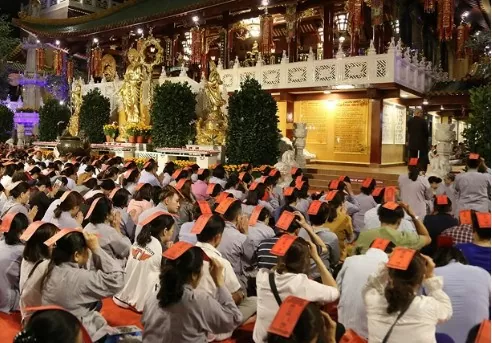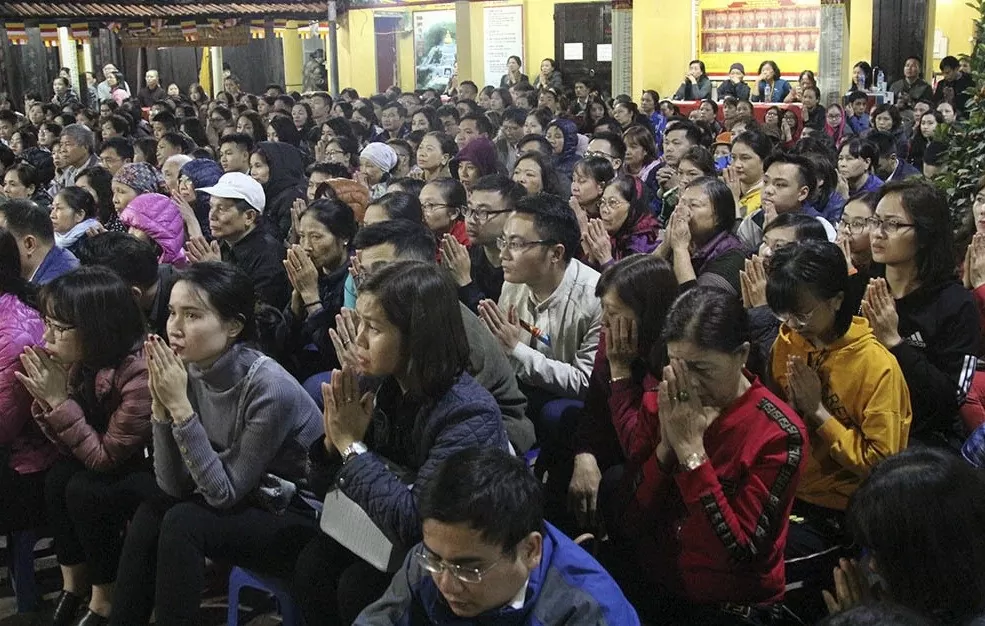Offering to the stars to ward off bad luck reflects people's need to seek peace. However, believing too much in this ritual can also create unpredictable consequences.
Offering to the stars to ward off bad luck is a popular belief and ritual in East Asian culture, especially in Vietnam. According to folk beliefs, each person in each year is governed by a star. Among them, there are good stars that bring luck and fortune, and bad stars that cause misfortune and disaster. Therefore, at the beginning of the year, many people perform star offering ceremonies to ward off bad luck in the hope of dispelling bad luck and praying for a peaceful and favorable year.
However, this belief is still controversial. Many questions have been raised such as: Should this belief continue to be maintained? Does offering to the stars to ward off bad luck really help people escape bad luck or is it just a superstitious practice?
Long-standing belief
Offering to the stars to dispel bad luck originates from the concept of the nine stars in the Eastern astrology system. Accordingly, each person will be affected by one of the nine stars (called bad stars) every year. If you encounter bad stars such as Rahu, Ketu, or Taibai, you need to perform a star offering ceremony to reduce bad luck.
 |
| During the New Year, many people often hold star offering ceremonies to ward off bad luck at religious establishments. Illustrative photo |
From the perspective of folk beliefs, offering to the stars to ward off bad luck comes from the psychological anxiety of possible misfortunes. In traditional societies, when science was not yet developed, people sought spiritual methods to calm their minds. However, according to orthodox Buddhism, offering to the stars to ward off bad luck is not a ritual in Buddhist teachings. The Buddha taught that people will receive the consequences of their actions (the law of cause and effect), and that there is no such thing as worshipping that can change fate.
However, in reality, many temples still hold star offering ceremonies to ward off bad luck, attracting a large number of people to participate. This causes the boundary between folk beliefs and religion to become increasingly blurred.
Since ancient times, people have always had a need to seek spiritual peace. Offering prayers to the stars to dispel bad luck, from this perspective, can help people feel more secure and optimistic in life. When performing the ritual, people believe that bad luck will be resolved, thereby having a more positive attitude towards life.
If done properly, offering sacrifices to the stars to ward off bad luck can become a beautiful cultural feature, contributing to the preservation of folk beliefs. This is also an opportunity for people to turn to good deeds and live more responsibly towards themselves and the community.
Although there is no scientific basis, believing in the stars can help people adjust their behavior, be more careful in their words and actions to avoid misfortune. This can help them live more positively, be more forewarned and not be subjective in the face of life's changes.
The downside of offering sacrifices to the stars to ward off bad luck
After many years of being preserved among the people, the ritual of offering stars to ward off bad luck has lost its original cultural significance. Nowadays, many places charge high fees to perform the ceremony, creating fear among people that if they do not make offerings, they will encounter bad luck. This has gradually turned the offering stars to ward off bad luck into a form of religious business rather than a purely spiritual activity.
Offering prayers to the stars to dispel bad luck also makes people depend on worship instead of making efforts to change their lives. The idea that “if you have a limit, go and resolve it” can make many people lose the motivation to improve themselves. They put their faith in worship instead of changing themselves, doing good deeds or living morally. This goes against the law of cause and effect, when people want a good life but do not actually act to create it.
In addition, every year, millions of people spend a lot of money on star worshiping ceremonies to ward off bad luck. In particular, some people are so worried that they spend all their assets on worshiping, leading to economic imbalance in their families. Meanwhile, this money could be used for more useful things such as helping the poor, investing in education, or improving their personal lives.
As mentioned, Buddhism does not have the concept of offering to the stars to dispel bad luck. Buddha taught that each person's karma is created by themselves, and cannot be erased by simply offering to the stars. However, due to the mixture of folk beliefs and Buddhism, many people mistakenly believe that this is an orthodox Buddhist ritual, leading to misunderstandings about the teachings.
 |
| Offering to the stars to dispel bad luck can lose its good meaning if not practiced properly. Photo: Doan Bong |
Sharing his views on this issue, Associate Professor Dr. Pham Ngoc Trung, former Head of the Department of Culture and Development (Academy of Journalism and Communication) said that according to the ancients, when bad stars shine on people, they will encounter bad luck such as accidents, diseases, and illness. Therefore, offering stars to resolve bad luck will help neutralize bad stars and attract energy from good stars.
To ward off bad luck, ancient people went to temples and shrines to make offerings to the stars with simple procedures, mainly to comfort their spirits and ease their worries. However, nowadays, some spiritual practitioners deliberately exaggerate the influence of the stars on fate, causing people to fear and rush to perform ceremonies and worship.
Every year, from the 8th to the end of January, in addition to temples, some pagodas also attract people to come and pray for good luck, with prices ranging from several hundred thousand to millions of dong per person. The scale of the ceremony each night can reach hundreds, even thousands of people. However, this is mainly for spiritual purposes.
"Offering stars to ward off bad luck is only a spiritual consolation, it cannot completely erase bad things. Although it shows belief in sacred things, offering stars to ward off bad luck needs to be practiced correctly, avoiding blindness and waste," said Associate Professor, Dr. Pham Ngoc Trung.
It can be seen that offering stars to ward off bad luck is a long-standing custom, reflecting people's anxiety and need to find peace. However, whether or not to perform this ritual depends on each person's perspective. If you only consider this as a form of praying for peace, reminding yourself to live well, then there is nothing wrong. But if you believe in it too much, seeing it as the only way to avoid disaster, you may fall into superstition.
Instead of worrying about bad stars or bad luck, people should focus on cultivating their minds, doing good deeds, and living responsibly towards themselves and society. When we have a good heart and a positive lifestyle, we will create our own luck, without having to pray for this.
The custom of offering sacrifices to the stars to ward off bad luck comes from the belief that each year, a person has a star that shines on them. There are 9 stars in total, including Thai Duong, Thai Am, Moc Duc, Ke Do, La Hau, Thai Bach, Tho Tu, Van Han, and Thuy Dieu. Among them, Thai Duong and Thai Am are good stars, while La Hau, Ke Do and Thai Bach are bad stars, believed to cause people to encounter misfortune, illness, disease, and generally bad luck. However, science has never confirmed the existence of the above 9 stars or their influence on human life. |
Source: https://congthuong.vn/dang-sao-giai-han-nen-hay-khong-nen-373266.html


![[Photo] Readers line up to visit the photo exhibition and receive a special publication commemorating the 135th birthday of President Ho Chi Minh at Nhan Dan Newspaper](https://vphoto.vietnam.vn/thumb/1200x675/vietnam/resource/IMAGE/2025/5/17/85b3197fc6bd43e6a9ee4db15101005b)



![[Photo] Prime Minister Pham Minh Chinh chairs meeting on science and technology development](https://vphoto.vietnam.vn/thumb/1200x675/vietnam/resource/IMAGE/2025/5/17/ae80dd74c384439789b12013c738a045)
![[Photo] More than 17,000 candidates participate in the 2025 SPT Competency Assessment Test of Hanoi National University of Education](https://vphoto.vietnam.vn/thumb/1200x675/vietnam/resource/IMAGE/2025/5/17/e538d9a1636c407cbb211b314e6303fd)































![[Photo] Nearly 3,000 students moved by stories about soldiers](https://vphoto.vietnam.vn/thumb/1200x675/vietnam/resource/IMAGE/2025/5/17/21da57c8241e42438b423eaa37215e0e)







































































Comment (0)